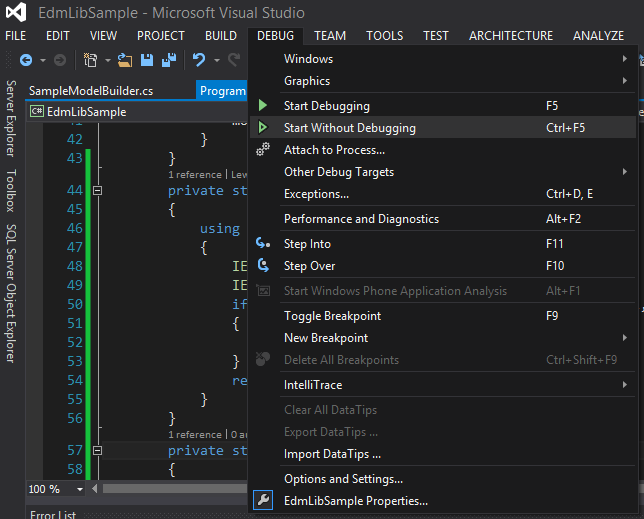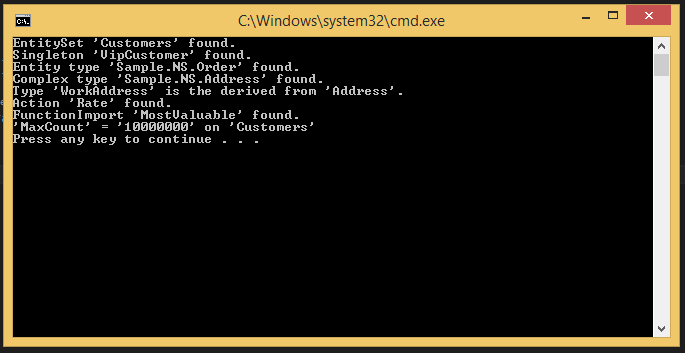Note
Access to this page requires authorization. You can try signing in or changing directories.
Access to this page requires authorization. You can try changing directories.
Applies To: # OData core lib v7 supported OData Core Lib V7
OData Core Lib V7
The model utilities include many useful extension methods to various EDM classes and interfaces (e.g., IEdmModel, IEdmType, ...). The extension methods are intended to implement some commonly reusable logic to simplify model manipulations. These methods can be roughly classified into five categories:
- Searching. The naming convention is
Find<ElementName>(e.g.,IEdmModel.FindDeclaredEntitySet()); - Predicate. The naming convention is
Is<ElementName>(e.g.,IEdmOperation.IsFunction()); - Information. The naming convention is
<InformationName>(e.g.,IEdmNavigationSource.EntityType()); - Getter. The naming convention is
Get<Name>(e.g.,IEdmModel.GetTermValue()); - Setter. The naming convention is
Set<Name>(e.g.,IEdmModel.SetEdmVersion()).
The most widely used parts are Searching, Predicate, and Information. Extension methods in the latter two parts are trivial, because they work literally as their names suggest. This section focuses on Searching. We will use and extend the sample from the previous section.
Exercise model utility APIs
In the Program.cs file, add the using directive
using System.Linq;
and insert the following code into the Program class:
namespace EdmLibSample
{
class Program
{
public static void Main(string[] args)
{
...
WriteModelToCsdl(model, "csdl.xml");
#region !!!INSERT THE CODE BELOW!!!
TestExtensionMethods(model);
#endregion
var model1 = ReadModel("csdl.xml");
...
}
...
private static void TestExtensionMethods(IEdmModel model)
{
// Find an entity set.
var customerSet = model.FindDeclaredEntitySet("Customers");
Console.WriteLine("{0} '{1}' found.", customerSet.NavigationSourceKind(), customerSet.Name);
// Find any kind of navigation source (entity set or singleton).
var vipCustomer = model.FindDeclaredNavigationSource("VipCustomer");
Console.WriteLine("{0} '{1}' found.", vipCustomer.NavigationSourceKind(), vipCustomer.Name);
// Find a type (complex or entity or enum).
var orderType = model.FindDeclaredType("Sample.NS.Order");
Console.WriteLine("{0} type '{1}' found.", orderType.TypeKind, orderType.FullName());
var addressType = model.FindDeclaredType("Sample.NS.Address");
Console.WriteLine("{0} type '{1}' found.", addressType.TypeKind, addressType);
// Find derived type of some type.
var workAddressType = model.FindAllDerivedTypes((IEdmStructuredType)addressType).Single();
Console.WriteLine("Type '{0}' is the derived from '{1}'.", ((IEdmSchemaType)workAddressType).Name, addressType.Name);
// Find an operation.
var rateAction = model.FindDeclaredOperations("Sample.NS.Rate").Single();
Console.WriteLine("{0} '{1}' found.", rateAction.SchemaElementKind, rateAction.Name);
// Find an operation import.
var mostValuableFunctionImport = model.FindDeclaredOperationImports("MostValuable").Single();
Console.WriteLine("{0} '{1}' found.", mostValuableFunctionImport.ContainerElementKind, mostValuableFunctionImport.Name);
// Find an annotation and get its value.
var maxCountAnnotation = (IEdmVocabularyAnnotation)model.FindDeclaredVocabularyAnnotations(customerSet).Single();
var maxCountValue = ((IEdmIntegerValue)maxCountAnnotation.Value).Value;
Console.WriteLine("'{0}' = '{1}' on '{2}'", maxCountAnnotation.Term.Name, maxCountValue, ((IEdmEntitySet)maxCountAnnotation.Target).Name);
}
}
}
Run the sample
From the DEBUG menu, click Start Without Debugging to build and run the sample. The console window should not disappear after program exits.

The output on the console window should look like the following:
